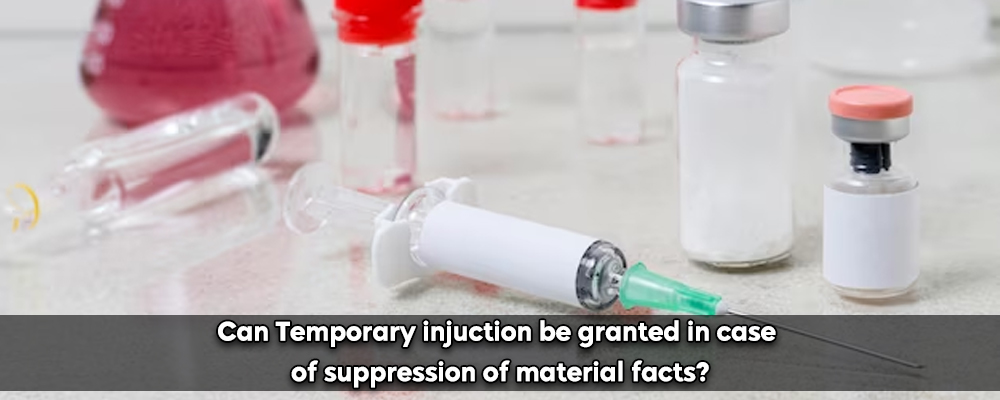The exercise of discretion in granting a temporary injunction should be done legally. There can be no absolute standard established for the court’s guidance in this regard. Therefore, it is generally established that the judge must assess whether the application falls into the following categories or whether the plaintiff has made the following arguments before issuing the temporary injunction.
- Prima Facie Case
- Irreparable Injury
- Balance of Inconvenience
- Other Factor
Need A Legal Advice
The internet is not a lawyer and neither are you. Talk to a real lawyer about your legal issue

Reasons for granting a court-issued interim injunction
The interim injunction may be given in any litigation if the court is convinced that there are adequate grounds to award the temporary injunction, according to Section 95 of the CPC. If the Defendant is claiming in the Plaintiff’s application but the Plaintiff is unable to provide adequate grounds, the Court may award the Defendant the appropriate compensation.
The Court may issue the interim injunction under Section 95 when taken in conjunction with Order 39 Rules 1 and 2:
- When there is a reasonable suspicion that property will be sold or otherwise disposed of by a party to the lawsuit or wilfully wasted;
- When there is a suspicion that property will be sold or otherwise disposed of to cheat creditors; or
- When the defendant threatens to seize the plaintiff’s property or otherwise hurts the plaintiff’s interests in the disputed property;
- When the defendant is about to break a contract; when any other harm is likely to be caused or likely to occur again; or
- When the court determines that an injunction is necessary to protect the interests of any party to the lawsuit or to uphold justice.
When a permanent injunction cannot be issued.
- To prevent anybody from initiating a legal action in the venue of the lawsuit where an injunction is requested, unless restrictions are required to avoid duplication of actions.
- To prevent anyone from starting or continuing any legal action in a court that is not above the one from which an injunction is requested.
- To prevent anyone from applying to any legislative body,
- To prevent the breaking of a contract whose fulfillment could not be precisely enforced by prohibiting anybody from starting or continuing any criminal case.
- To forbid an action because it will cause a nuisance, even if it is not immediately obvious that it would.
- To stop a breach to which the plaintiff has consented from continuing,
- Except in cases of breach of trust, when the conduct of the plaintiff or his representatives has been such as to disentitle him to the help of the Court. When any other customary way of procedure may unquestionably be used to attain an equally effective remedy.
- Where the plaintiff is not personally involved.
Case Law
In the case of Nanjamma & Others AND Rajamma & Others, M.F.A No 2172/2023, The Karnataka High Court has ruled that the relief of a temporary injunction under Order 39 Rules 1 and 2 of the Code of Civil Procedure (CPC) is a discretionary remedy that necessitates a careful balancing act between the necessity for temporary relief and the continuing judicial procedures. This discretion should not be used when crucial information is withheld from the Trial Court, according to Justice H.P. Sandesh, and providing incorrect or misleading information to get such interim relief might compromise the fairness of the legal system.
The Bench discovered that the appellants had already asserted their claim to a specific piece of property in a 2014 lawsuit seeking a permanent injunction. This claim was based on several occasions over several years, including occurrences in 2008 and subsequent contacts with the subject property.
The appellants then went back to court in 2022 to ask for an injunction against the respondents for allegedly obstructing their building work on the same land. The Court determined that the cause of action alleged in both cases was virtually the same after carefully examining the circumstances leading up to both lawsuits. It highlighted the fact that the appellants in both cases had asked for the same type of relief: an injunction prohibiting the defendants from interfering with development projects on the contested land.
The Bench emphasized that the Trial Court’s decision to award an injunction was not justified by the possibility that an appeal would result in a different result. It stated that the Trial Court should have used its discretion with more caution, particularly in light of the pending appeal, which had the authority to reconsider the case’s facts and law.
Lead India provides free legal advice, legal services, and online internet data. The best course of action in this situation is to talk to a lawyer and ask a legal question.




